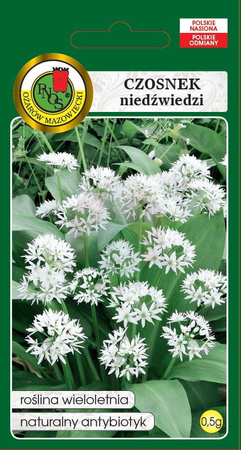- Frost-resistant plant with medicinal properties. Stimulates the immune system. The garlic-scented leaves - basic herbal and spice material - contain a lot of vitamin C. They can be pickled, pickled and added to salads.
Frost-resistant plant with medicinal properties. Stimulates the immune system. The garlic-scented leaves - basic herbal and spice material - contain a lot of vitamin C. They can be pickled, pickled and added to salads. Bear's garlic prefers permeable, fertile soil and a shaded position. Sowing seeds - in early autumn.
Wild garlic (Allium ursinum L.) is a representative of the garlic family, it grows wild in Europe, Asia Minor and the Caucasus, and is also cultivated in other regions. In Poland, it occurs mainly in the Sudetes, the Carpathians, the Foothills and the adjacent area (the Sandomierz Basin and the highlands), where it is quite common. In Poland, it is partially protected. The plant reaches a height of 20–50 cm. It grows in clumps, sometimes creating large, compact patches.
Bear's garlic blooms from April to May. The plant is insect-pollinated, but pollination may also occur spontaneously, because after some time the unpollinated pistil bends, touching the stamens. The plant has been under partial species protection in Poland since 2004. The main threat is improper forest management: reconstruction of mixed forests into monoculture coniferous forests and destruction of its habitats in riparian forests during river regulation.
Bear's garlic has a strong bactericidal effect, lowers blood pressure, has a beneficial effect on the heart, prevents malignant tumors and atherosclerosis, and stimulates the secretion of gastric juice and bile. Its strong bactericidal effect is particularly useful in the treatment of upper respiratory tract diseases, and in addition to killing bacteria, garlic stimulates the secretion of mucus in the bronchi.
Unlike most species of garlic, shady or semi-shady places, preferably under tree crowns, are best suited for growing wild garlic. It requires fertile, humus soil, moderately moist, with a reaction close to neutral or slightly alkaline. It is a completely frost-resistant plant (geophyte). It is not recommended to plant it in wet soil, as its bulbs are then exposed to rot. It is worth leaving a lot of free space in the garden, because the next year, after flowering, the seeds scattered by insects will germinate and produce new plants (it is quite expansive). We can also grow wild garlic in containers on the balcony or terrace.
If we do not want to wait until autumn to sow the seeds, we can store the seeds in a foil bag with moist sand in the shade at a temperature of 20-25°C for 4 weeks, and then put the whole thing in the refrigerator (0-4°C) for another 4 weeks. . Only this treatment guarantees proper seed germination.
Bear's garlic is most often planted or sown in early autumn at 30 x 30 cm spacing at a depth of 1-2 cm, in boxes it can be slightly denser.
Wild garlic should be watered in moderation. It needs more intensive irrigation during periods of drought, in hot springs and summers, or when grown in pots (the soil then dries out faster). We should not flood the site so that the onions do not rot.
It is also worth feeding the plants with multi-component fertilizer into the soil. In August, we can clean the flowerbed of yellowed leaves, then dig out the bulbs and transplant them. In autumn, a beneficial procedure for development is mulching with compost and deacidified peat. Feeding plants after cutting leaves or transplanting can speed up their regrowth in spring. Garlic grown in a container should be fertilized more often.
- Number of seeds: 130 pcs. in gram
- Packaging 0.5g








